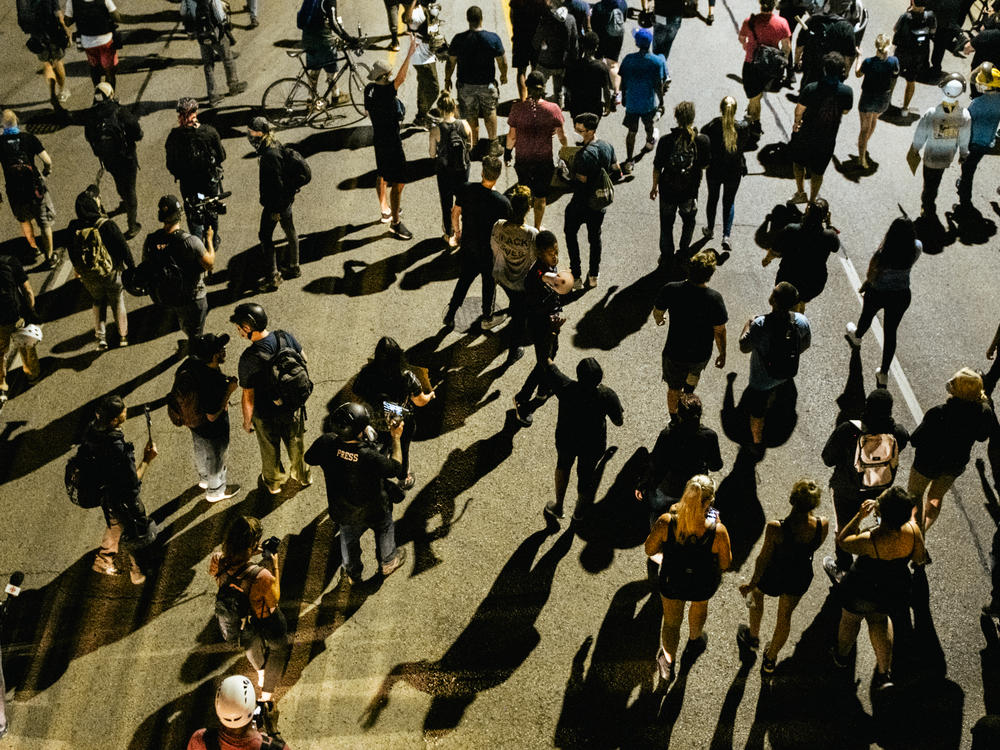Section Branding
Header Content
Protester shot by Kyle Rittenhouse in Kenosha is now suing Wisconsin authorities
Primary Content
Updated October 18, 2021 at 3:58 PM ET
Gaige Grosskreutz, who was shot by Kyle Rittenhouse during racial justice protests in Kenosha, Wisconsin last year, is suing the city, the county and several law enforcement officers, claiming they condoned the efforts of white nationalists to violently dispel demonstrators protesting a police shooting.
A wave of protests erupted in Kenosha in August of last year following the shooting of Jacob Blake, a Black man who was shot multiple times by a white police officer at point-blank range and left paralyzed from the waist down.
At one of the protests, the then 17-year-old Rittenhouse shot and killed two people — Anthony Huber and Joseph Rosenbaum — and wounded Grosskreutz, who says he lost 90% of his right bicep. Prosecutors have charged Rittenhouse with killing the two men and shooting Grosskreutz. Rittenhouse, whose trial has been delayed until November, claims the shootings were in self-defense and has pleaded not guilty.
According to Grosskreutz's federal lawsuit filed in the Eastern District of Wisconsin on Thursday, authorities in Kenosha not only knew that armed vigilantes planned to patrol the protest attended by Black Lives Matter supporters, but also encouraged their participation.
"It was not a mistake that Kyle Rittenhouse would kill two people and maim a third on that evening," the lawsuit claims. "It was a natural consequence of the actions of the Kenosha Police Department and Kenosha Sherriff's office in deputizing a roving militia to 'protect property' and 'assist in maintaining order.'"
Grosskreutz says the coordination between authorities and armed citizens like Rittenhouse deprived the protestors of their constitutional right to freedom of speech, endangering them during the demonstration.
"Defendants' open support of and coordination with the armed individuals in the minutes and hours before the shootings deprived Anthony Huber and the other protestors of the basic protections typically provided by police," the lawsuit says. "It was a license for the armed individuals to wreak havoc and inflict injury."
The lawsuit also alleges that the police treated Rittenhouse the way they did because he was white, and that if an armed Black man had offered to patrol the protest, "he most likely would have been shot dead."
Sam Hall, the attorney representing Kenosha County and Sheriff David Beth, said in a statement that the allegations against his clients were false.
"The lawsuit also fails to acknowledge that Mr. Grosskreutz was himself armed with a firearm when he was shot and Mr. Grosskreutz failed to file this lawsuit against the person who actually shot him," Hall said. "Sheriff Beth and Kenosha County plan to promptly file a motion to dismiss this case."
In an interview with the Milwaukee Journal Sentinel, Grosskreutz said he has a concealed carry permit to carry a gun.
NPR also reached out to the city of Kenosha and its police department. The city declined to comment.
Since the shootings, Rittenhouse has received support from conservative groups and Blue Lives Matter activists. President Trump declined to condemn his actions in the days after the shootings.
The Kenosha Police Department announced in April that Rusten Sheskey, the officer who shot Blake, acted within department policy and wouldn't face discipline. Federal prosecutors said this month that they would not file charges against Sheskey.
Blake has filed a federal lawsuit against Sheskey, accusing him of excessive force.
Copyright 2021 NPR. To see more, visit https://www.npr.org.

